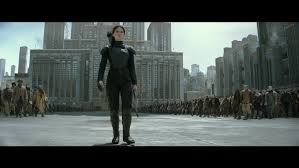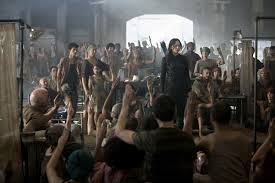NO MORE FUN AND HUNGER GAMES: The Hunger Games: Mockingjay – Part 2
Posted: December 7, 2015 | Author: Donald | Filed under: Uncategorized | Tags: Danny Strong, Donald Sutherland, Francis Lawrence, Jennifer Lawrence, Julianne Moore, Mockingjay, Peter Craig, Philip Seymour Hoffman, Suzanne Collins, The Hunger Games | 2 Comments »First, a word from our sponsors: I am now offering a new service: so much emphasis has been given lately to the importance of the opening of your screenplay, I now offer coverage for the first twenty pages at the cost of $20.00. For those who don’t want to have full coverage on their screenplay at this time, but want to know how well their script is working with the opening pages, this is perfect for you. I’ll help you not lose the reader on page one.
Ever wonder what a reader for a contest or agency thinks when he reads your screenplay? Check out my new e-book published on Amazon: Rantings and Ravings of a Screenplay Reader, including my series of essays, What I Learned Reading for Contests This Year, and my film reviews of 2013. Only $2.99. http://ow.ly/xN31r
and check out my Script Consultation Services: http://ow.ly/HPxKE
Warning: SPOILERS
 At the end of The Hunger Games: Mockingjay – Part 1, I was left with one burning question: was Alma Coin, leader of the revolution, trying to bring freedom to the land, or was she only seeking power?
At the end of The Hunger Games: Mockingjay – Part 1, I was left with one burning question: was Alma Coin, leader of the revolution, trying to bring freedom to the land, or was she only seeking power?
Well, I have now seen The Hunger Games: Mockingjay – Part 2 and I have my answer.
And no, I’m not going to tell you because it leads to one of the most satisfying climactic scenes in movies for a while.
Of course, I should start off by saying that there is no way I will admit that The Hunger Games is great filmmaking. It certainly has a myriad of faults.
At the same time, I have found this franchise to be more intellectually intriguing, even fascinating, than others like it. There has always been something about the stories that stayed with me, something buried (a bit too much, I believe, at times) at the core of it. For me, The Hunger Games has always been a complex study of how a revolution begins, builds and bursts forth upon the land combined with the crowd pleasing wrappings of a commercial aesthetic.
It’s certainly no Lord of the Rings or Game of Thrones. Yet, I find it more rewarding than Harry Potter if for no other reason than half the time I never quite new where the story was going when it came to Hogwarts and environs (especially in the last entry which, in spite of being split into two films, I’m not convinced it ultimately made a lot of sense). Read the rest of this entry »
NO MORE FUN AND HUNGER GAMES or THE REVOLUTION WILL BE TELEVISED: Movie review of The Hunger Games: Mockingjay-Part I by Howard Casner
Posted: November 28, 2014 | Author: Donald | Filed under: Uncategorized | Tags: Danny Strong, Donald Sutherland, Elizabeth Banks, Francis Lawrence, Jeffrey Wright, Jennifer Lawrence, Josh Hutcherson, Julianne Moore, Liam Helmsworth, Peter Craig, Philip Seymour Hoffman, Stanley Tucci, Suzanne Collins, The Hunger Games: Mockingjay-Part I, Woody Harrelson | 8 Comments »First, a word from our sponsors. Ever wonder what a reader for a contest or agency thinks when he reads your screenplay? Check out my new e-book published on Amazon: Rantings and Ravings of a Screenplay Reader, including my series of essays, What I Learned Reading for Contests This Year, and my film reviews of 2013. Only $2.99. http://ow.ly/xN31r
Warning: SPOILERS
 Okay.
Okay.
How to start.
Well, there’s really no point in putting it off.
At the risk of losing what little reputation I have (if I even have one); at the risk of inviting ridicule, derision, mockery and scorn from those who read my reviews who don’t already hold me in ridicule, derision, mockery and scorn; and at the risk of being reviled by serious filmgoers far and wide…
The Hunger Games: Mockingjay-Part I is not nearly as bad as the critics claim it is and is by far the best entry in the franchise to date, far better than the first two films. Read the rest of this entry »
Movie Reviews of COLD COMES THE NIGHT and THE BEST OFFER by Howard Casner
Posted: January 15, 2014 | Author: Donald | Filed under: Uncategorized | Tags: Alice Eve, Bryan Cranston, Cold Comes the Night, Donald Sutherland, Geoffrey Unsworth, Giuseppe Tornatore, Jim Sturgess, Logan Marshall-Green, Nick Simon, Osgood Perkins, Sylvia Hoeks, The Best Offer, Tze Chun | 1,580 Comments »Cold Comes the Night is a movie genre that is often described as: it does absolutely nothing, but does it very well—except that in this case, it only does it fairly well. As usual for this sort of movie, it’s a thriller and revolves around a woman who runs a sleazy motel that a local police officer uses for his pimp trade. She has a daughter who social services is threatening to take away (which is hard to argue with), so when a mob bagman who is going blind comes through and his driver is killed by a prostitute he attacks, the mother sees a way out of her circumstances.
The movie is buoyed by a rather clever and in many ways well written screenplay by Osgood Perkins, Nick Simon and the director Tze Chun, full of nail biting twists and turns and a few unexpected surprises. It also has a strong, empathetic performance by Alice Eve in the lead and a rather effective one in Logan Marshall-Green as the more than somewhat sociopathic cop.
Unfortunately, it also has Bryan Cranston in the roll of the bagman Topo (an unfortunate name since it makes me think of Ed Sullivan and the mouse that would show up on occasion), and this part really doesn’t work as well as it needs to. Since Topo is not developed fully enough to become a character in his own right, he and his fading eyesight end up being nothing more than mere plot devices, which doesn’t work to the advantage of the movie as a whole. But even more unfortunate, the character is also Russian in background, and whenever Cranston speaks, well, sorry to say, all I could think was “moose and squirrel”.
The Best Offer is also a thriller of sorts, a con game/heist film about a germ phobic and highly superstitious auctioneer who has, over the years, unethically, and probably illegally as well, collected a series of classical portraits of women at bargain basement prices in comparison to their real worth. He then is hired to appraise and sell the contents of a mansion inhabited by an agoraphobic woman.
Though all the main actors are non-Italian and they all speak English, the film won the David di Donatello award for best picture (sort of the Italian Oscars) over such movies as Reality, though I’m not sure how. It has its moments, and though it has all the right ingredients, it never quite comes together in a satisfactory manner.
The story is divided into three parts. The first sets up the personality of the quirksome, to say the least, auctioneer Virgil Oldman, played rather effetely by Geoffrey Unsworth. It also dramatizes how he pulls off his cons (which are very clever, one must give it up to him) and how he comes to accept the job offer by the agoraphobic Claire (Sylvia Hoeks). This part is on the nose, obvious, with acting that is a bit too arch (Unsworth plays Virgil as if he were the Scarlet Pimpernel) and dialog a bit more than expositional. At the same time, it does draw you in as you want to know exactly what the con aimed at the auctioneer is that’s surely to take place.
The second part focuses on the growing love between Virgil and Claire, with the Cupidic help of a repairman that Virgil uses in fixing antiques (Jim Sturgess). This is a tough bit of beef jerky to get through. First, it’s really rather difficult to have an emotional stake in whether Virgil finally finds true love and loses his virginity since he is a con man and not that pleasant a person. But the love story itself just never catches fire. And it takes forever for it not to. The forward momentum just stops dead here.
But there is the third part, which is a roller coaster ride of bitter revelation and emotional devastation as Virgil finds out just what has been done to him. Though we all saw it coming, we still feel for him, even though, in many ways, he hasn’t earned it.
The screenplay and direction are by Giuseppe Tornatore, who also gave us Cinema Paradiso. While he does little with the first two parts, the third is a thrilling bit of editing, acting and writing. But unfortunately, it’s a bit too little too late.
Also starring Donald Sutherland with an unsteady accent as Virgil’s partner in crime.











